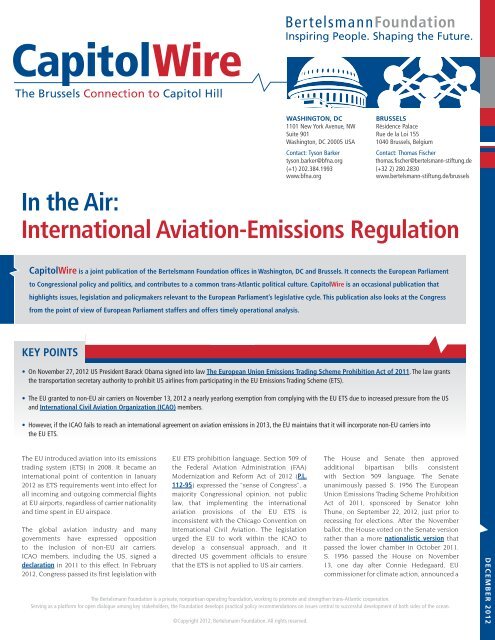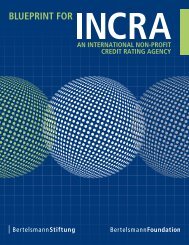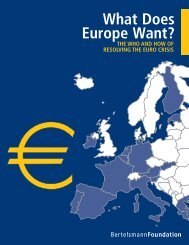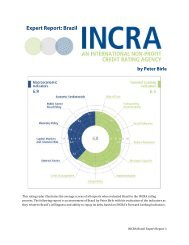CapitolWire Dec 2012.pdf - Bertelsmann Foundation
CapitolWire Dec 2012.pdf - Bertelsmann Foundation
CapitolWire Dec 2012.pdf - Bertelsmann Foundation
You also want an ePaper? Increase the reach of your titles
YUMPU automatically turns print PDFs into web optimized ePapers that Google loves.
<strong>CapitolWire</strong><br />
The Brussels Connection to Capitol Hill<br />
Inspiring People. Shaping the Future.<br />
WASHINGTON, DC<br />
1101 New York Avenue, NW<br />
Suite 901<br />
Washington, DC 20005 USA<br />
Contact: Tyson Barker<br />
tyson.barker@bfna.org<br />
(+1) 202.384.1993<br />
www.bfna.org<br />
BRUSSELS<br />
Résidence Palace<br />
Rue de la Loi 155<br />
1040 Brussels, Belgium<br />
Contact: Thomas Fischer<br />
thomas.fischer@bertelsmann-stiftung.de<br />
(+32 2) 280.2830<br />
www.bertelsmann-stiftung.de/brussels<br />
In the Air:<br />
International Aviation-Emissions Regulation<br />
<strong>CapitolWire</strong> is a joint publication of the <strong>Bertelsmann</strong> <strong>Foundation</strong> offices in Washington, DC and Brussels. It connects the European Parliament<br />
to Congressional policy and politics, and contributes to a common trans-Atlantic political culture. <strong>CapitolWire</strong> is an occasional publication that<br />
highlights issues, legislation and policymakers relevant to the European Parliament’s legislative cycle. This publication also looks at the Congress<br />
from the point of view of European Parliament staffers and offers timely operational analysis.<br />
KEY POINTS<br />
• On November 27, 2012 US President Barack Obama signed into law The European Union Emissions Trading Scheme Prohibition Act of 2011. The law grants<br />
the transportation secretary authority to prohibit US airlines from participating in the EU Emissions Trading Scheme (ETS).<br />
• The EU granted to non-EU air carriers on November 13, 2012 a nearly yearlong exemption from complying with the EU ETS due to increased pressure from the US<br />
and International Civil Aviation Organization (ICAO) members.<br />
• However, if the ICAO fails to reach an international agreement on aviation emissions in 2013, the EU maintains that it will incorporate non-EU carriers into<br />
the EU ETS.<br />
The EU introduced aviation into its emissions<br />
trading system (ETS) in 2008. It became an<br />
international point of contention in January<br />
2012 as ETS requirements went into effect for<br />
all incoming and outgoing commercial flights<br />
at EU airports, regardless of carrier nationality<br />
and time spent in EU airspace.<br />
The global aviation industry and many<br />
governments have expressed opposition<br />
to the inclusion of non-EU air carriers.<br />
ICAO members, including the US, signed a<br />
declaration in 2011 to this effect. In February<br />
2012, Congress passed its first legislation with<br />
EU ETS prohibition language. Section 509 of<br />
the Federal Aviation Administration (FAA)<br />
Modernization and Reform Act of 2012 (P.L.<br />
112-95) expressed the “sense of Congress”, a<br />
majority Congressional opinion, not public<br />
law, that implementing the international<br />
aviation provisions of the EU ETS is<br />
inconsistent with the Chicago Convention on<br />
International Civil Aviation. The legislation<br />
urged the EU to work within the ICAO to<br />
develop a consensual approach, and it<br />
directed US government officials to ensure<br />
that the ETS is not applied to US air carriers.<br />
The <strong>Bertelsmann</strong> <strong>Foundation</strong> is a private, nonpartisan operating foundation, working to promote and strengthen trans-Atlantic cooperation.<br />
Serving as a platform for open dialogue among key stakeholders, the <strong>Foundation</strong> develops practical policy recommendations on issues central to successful development of both sides of the ocean.<br />
©Copyright 2012, <strong>Bertelsmann</strong> <strong>Foundation</strong>. All rights reserved.<br />
©Copyright 2010, <strong>Bertelsmann</strong> <strong>Foundation</strong>. All rights reserved.<br />
The House and Senate then approved<br />
additional bipartisan bills consistent<br />
with Section 509 language. The Senate<br />
unanimously passed S. 1956 The European<br />
Union Emissions Trading Scheme Prohibition<br />
Act of 2011, sponsored by Senator John<br />
Thune, on September 22, 2012, just prior to<br />
recessing for elections. After the November<br />
ballot, the House voted on the Senate version<br />
rather than a more nationalistic version that<br />
passed the lower chamber in October 2011.<br />
S. 1956 passed the House on November<br />
13, one day after Connie Hedegaard, EU<br />
commissioner for climate action, announced a<br />
DECEMBER 2012
temporary exemption from the ETS for non-EU year exemption period—it made official the<br />
airlines. She cited progress at ICAO-led Inspiring global US People. government’s Shaping support of an the international Future.<br />
<strong>CapitolWire</strong><br />
negotiations on the issue as the reason for the approach to reducing aviation emissions.<br />
exemption.<br />
The EU’s proposed freeze on the application<br />
to non-EU air carriers is set to continue<br />
The Brussels Connection to Capitol until the 2013 Hillmeeting of ICAO, by which<br />
time an international agreement on aviation<br />
emissions may be achieved. Regardless of<br />
the temporary exemption, President Obama WASHINGTON, DC<br />
BRUSSELS<br />
signed S. 1956 into law on November 27, 1101 2012. New York Avenue, NW Résidence Palace<br />
Suite 901<br />
Rue de la Loi 155<br />
Though the EU’s announcement rendered the<br />
Washington, DC 20005 USA 1040 Brussels, Belgium<br />
legislation irrelevant—at least for the<br />
Contact:<br />
one-<br />
Tyson Barker<br />
Contact: Thomas Fischer<br />
Sponsor of S. 1956: Senator John Thune (R-South Dakota)<br />
E-mail: tyson.barker@bertelsmannfoundation.org<br />
E-mail: thomas.fischer@bertelsmannstiftung.de<br />
The US Argument<br />
Washington’s stance on EU ETS has been to<br />
“support the goals, but oppose the action”,<br />
as Senator John Rockefeller, chairman of<br />
the Committee on Commerce, Science and<br />
Transportation, mentioned in a June hearing<br />
on the act. Proponents of S. 1956 recognize<br />
the necessity to reduce aviation’s impact on<br />
the environment but prefer an international<br />
approach.<br />
The EU ETS includes regulation of emissions<br />
produced by carriers while operating outside<br />
EU airspace and in countries that are simply<br />
being overflown. But the global aviation<br />
industry, the US and other countries contend<br />
that mandatory participation by non-EU<br />
air carriers in the ETS is a violation of state<br />
sovereignty. The US argues that international<br />
obligations of the Chicago Convention of<br />
1944 negate EU jurisdiction over regulating<br />
emissions in foreign or international<br />
airspace. The EU is not a signatory to the<br />
Chicago Convention, although all EU member<br />
states are.<br />
The costs of compliance are yet another<br />
concern. Though estimated to be minimal<br />
initially, charges to airlines and passengers<br />
are expected to increase as the EU ETS cap<br />
on total carbon-dioxide emissions decreases<br />
and the EU provides fewer CO 2<br />
allowances for<br />
air carriers to purchase. Estimates vary widely,<br />
but the US aviation industry believes the<br />
levies would amount to $3.1 billion between<br />
2012 and 2020.<br />
S. 1956: The EU ETS Prohibition Act<br />
Tel: (+1) 202.384.1993<br />
www.bertelsmann-foundation.org<br />
Tel: (+32 2) 280.2830<br />
www.bertelsmann-stiftung.de/brussels<br />
Market vulnerability and the use of collected<br />
revenues are other American concerns. A<br />
Senate Committee on Commerce, Science<br />
and Transportation report cites a European<br />
Commission proposal in July 2012 to raise<br />
carbon prices as evidence of the market’s<br />
susceptibility to manipulation. The ETS also<br />
has no requirement that revenue collected<br />
under the scheme must be used in research<br />
and development or initiatives aimed at<br />
reducing aviation emissions.<br />
The EU ETS Prohibition Act permits US air<br />
carriers to refuse participating in the EU ETS<br />
and gives the transportation secretary the<br />
authority to prohibit them from doing so.<br />
The act also directs the secretary, the Federal<br />
Aviation Administration (FAA) administrator<br />
and other officials to pursue an international<br />
agreement while ensuring US airlines are not<br />
penalized under the EU ETS.<br />
Two key amendments were added to S. 1956 to<br />
protect US taxpayers and grant the secretary<br />
more flexibility in determining US air-carrier<br />
participation. The first amendment, proposed<br />
by Senator Benjamin Cardin (D-Maryland),<br />
prohibits the use of taxpayer money to cover<br />
any taxes or penalties imposed on US air<br />
carriers for non-compliance with the EU-ETS.<br />
The senator’s proposal is partly in response<br />
to a provision of the EU ETS that makes an<br />
airline’s non-compliance subject to an “excess<br />
Key components of the EU ETS Prohibition Act of 2011<br />
Grants the transportation secretary the authority to prohibit US aircraft operators<br />
from participating in the EU ETS if deemed to be in the public interest<br />
Directs the transportation secretary, the Federal Aviation Administration chief and other<br />
appropriate officials to enter into international negotiations on aircraft emissions<br />
Directs appropriate officials to use applicable measures under existing<br />
authorities to ensure US air carriers are exempt from the EU ETS<br />
Prohibits the use of taxpayer dollars to pay for taxes and penalties<br />
imposed on US air carriers for non-compliance with the EU ETS<br />
Allows the transportation secretary to re-assess prohibiting<br />
US air carriers from participating in EU ETS<br />
DECEMBER 2012<br />
©Copyright 2010, <strong>Bertelsmann</strong> <strong>Foundation</strong>. All rights reserved.<br />
2
emissions penalty” equivalent to US$130 for public interest are made, and after any US<br />
each ton of carbon-dioxide emissions Inspiring above regulation People. of aviation Shaping emissions the is passed. Future.<br />
<strong>CapitolWire</strong><br />
its allowance. Harsher measures may also be This amendment was key to addressing<br />
imposed, including the possibility of banning Congressional concern about a possible USan<br />
air carrier from the EU.<br />
EU trade war over the emissions issue.<br />
The second amendment, proposed by<br />
The Brussels Connection to Capitol Senator Jeff Hill Merkley (D-Oregon), allows<br />
the transportation secretary to re-assess<br />
prohibiting US air carriers from EU ETS<br />
participation. The secretary can do this WASHINGTON, at DC<br />
any time but is required to do so after 1101 an New York Avenue, NW<br />
BRUSSELS<br />
Résidence Palace<br />
international agreement is reached,<br />
Suite<br />
any<br />
901<br />
Rue de la Loi 155<br />
Washington, DC 20005 USA 1040 Brussels, Belgium<br />
amendments to the EU directive affecting US<br />
Contact: Tyson Barker<br />
Contact: Thomas Fischer<br />
For prohibition US Transportation Secretary Ray LaHood<br />
E-mail: tyson.barker@bertelsmannfoundation.org<br />
E-mail: thomas.fischer@bertelsmannstiftung.de<br />
can stop US airlines form participating in the EU ETS.<br />
Tel: (+1) 202.384.1993<br />
www.bertelsmann-foundation.org<br />
US Efforts to Reduce Aviation Emissions<br />
Rather than regulating greenhouse-gas<br />
emissions through market-based approaches,<br />
the US government is pursuing policies<br />
to reduce emissions by developing a<br />
modernized air-traffic control system, cleaner<br />
air technology and alternative aviation fuels.<br />
The FAA released an “Aviation Greenhouse<br />
Gas Emissions Reduction Plan” in June 2012<br />
that focused on operational and technology<br />
improvements, developing and using<br />
alternative fuels, and pushing policies and<br />
research that support these improvements.<br />
The plan estimates that improvements in<br />
technology and operations will reduce CO 2<br />
emissions by 47 million tons in 2020.<br />
Next Steps<br />
The US has already begun implementing its<br />
Next Generation Air Transport System, known<br />
as Next Gen, a satellite-based air-trafficmanagement<br />
system aimed at creating more<br />
efficient and direct airline routes. This system<br />
will reduce an estimated 1.4 billion gallons of<br />
aviation fuel and 14 million metric tons of CO 2<br />
emissions through 2020. The US has also taken<br />
steps, outlined in the presidential directive<br />
“Blueprint for A Secure Energy Future”, to<br />
reduce its foreign energy dependence. The<br />
blueprint reflects a commitment to increasing<br />
the use of alternative fuels in the aviation<br />
sector.<br />
Tel: (+32 2) 280.2830<br />
www.bertelsmann-stiftung.de/brussels<br />
The European Commission and the FAA<br />
already cooperate in this area through the<br />
Atlantic Interoperability Initiative to Reduce<br />
Emissions (AIRE) program, which was<br />
launched in 2007. AIRE’s focus is to improve<br />
fuel efficiency, lower aviation emissions and<br />
reduce aircraft noise. The US participated in<br />
three AIRE demonstration projects in 2010<br />
and 2011 that concentrated on reducing<br />
fuel burn and emissions through flightoptimization<br />
procedures.<br />
Improvements in aviation design, air-traffic<br />
operations, and alternative fuels will create<br />
reductions in CO 2<br />
emissions. Nevertheless,<br />
an increase in fuel consumption and a<br />
more heated aviation-emissions debate are<br />
anticipated as international flight operations<br />
rise and the number of air passengers globally<br />
doubles to six billion by 2026.<br />
Over the past 15 years, the ICAO has made<br />
little progress towards an international<br />
agreement on an aviation-emission-trading<br />
scheme. The slow pace has led Australia<br />
and New Zealand, like the EU, to include the<br />
aviation sector in their domestic emissions<br />
schemes. However, both countries exempted<br />
international air carriers from any levies.<br />
in millions of tons of CO 2<br />
30%<br />
25%<br />
20%<br />
15%<br />
10%<br />
5%<br />
0%<br />
-5%<br />
-10%<br />
-15%<br />
1998<br />
Percent Changes in CO 2<br />
Emissions<br />
from International Aviation in the US and EU<br />
1999<br />
2000<br />
2001<br />
2002<br />
2003<br />
2004<br />
2005<br />
2006<br />
2007<br />
2008<br />
2009<br />
US<br />
EU<br />
For its part, the ICAO has established a highlevel<br />
group to formulate recommendations<br />
and a feasibility study for an international<br />
aviation market-based emissions measure<br />
scheme. The group will deliver its report and a<br />
measuring framework at the ICAO’s September<br />
2013 assembly. Commissioner Hedegaard has<br />
Source: IEA CO 2<br />
emissions estimates<br />
asserted that including non-EU air carriers in the EU ETS will resume if the ICAO is unable to<br />
conclude a global agreement by then. The US transportation department is optimistic that that<br />
won’t be the case.<br />
DECEMBER 2012<br />
©Copyright 2010, <strong>Bertelsmann</strong> <strong>Foundation</strong>. All rights reserved.<br />
3






